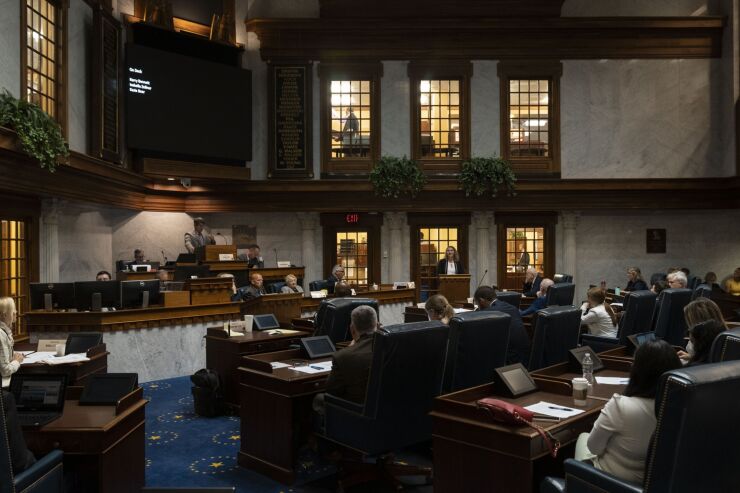Indiana saw a tax revenue windfall in January, with general fund revenues coming in 15.8% above last January’s number and 9.3% above December’s projections.
But the office of Chief Economist Hari Razafindramanana cautioned that individual income tax collections surpassed estimates only because of “unusual timing factors that are currently expected to normalize… over the coming months.”
Income tax collections netted $1.028 billion in January, 16.6% above the previous month’s estimate and 36.4% above January 2023’s totals, according to the State Budget Agency’s
Bloomberg News
“More than $200 million of the monthly collections is attributable to unusual payment timing as taxpayers adjust to recent tax law changes,” the chief economist’s office noted. “This combines with potentially more than $200 million of payments received in December also attributable to unusual payment timing. Over the coming months, monthly collections are expected to fluctuate significantly.”
Still, corporate tax collections brought in $46.7 million in January, which was 294.1% above December’s estimate and 139.9% above January 2023’s total. Razafindramanana’s office attributed the jump to factors including payment and refund timing, late payments and the repeal of the utility receipts tax and utility services use tax.
Sales tax collections and riverboat gambling tax collections were both down year-over-year, falling 1.4% and 4.8%, respectively, below January 2023’s totals.
With April and June being the two highest revenue activity months of the year, budget officials urged patience and said year-over-year comparisons will be more revealing then. Razafindramanana’s office did not respond to requests for comment.
Not everyone wants to wait to put the surplus to use. State Rep. Greg Porter, D-Indianapolis, has reportedly suggested the state deploy the extra tax revenue to address an unexpected shortfall in the state’s Medicaid funding, according to the
In December, state legislators found out that Indiana’s Medicaid program would be underfunded by $1 billion due to a forecasting error.
“This underfunding of such a critical program is an unfortunate surprise that was hidden from the General Assembly until the last minute, and now leaves the Medicaid program to scramble to figure out which programs they are going to have to cut,” Porter
Porter’s Democrats are in the minority in the Indiana State House, where the GOP runs the show, and Republican Eric Holcomb is the governor.
The state Family and Social Services Administration has attributed the unexpected expenses driving the shortfall to the attendant care program, which pays family caregivers of the elderly or disabled children roughly $15 an hour. The disabled children’s portion of the program
The FSSA wants to transition the families using the attendant care program to a different program that pays caregivers a daily stipend instead of an hourly wage, which, along with other changes, could save the state Medicaid program millions.
Indiana’s modified version of the Affordable Care Act’s expanded Medicaid program is nine years old.
Indiana’s Republican leaders under then-Gov. Mike Pence enacted the Healthy Indiana Plan, which adds
The Trump administration
